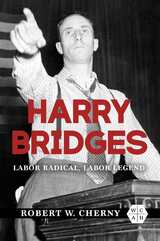
traces the transitions in American critical theory and practice from the 1950s
to the 1980s. It focuses on the influence of French structuralism and post-structuralism
on American deconstruction within a wide-ranging context that includes literary
criticism, philosophy, psychology, technology, and politics.
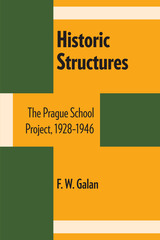
In this first book-length study of Czech structuralism and semiotics in English, F. W. Galan explores one of the most important intellectual currents of the twentieth century, filling the gap between what has been written of the Russian formalism of the twenties and the French structuralism of the sixties and seventies. He records the evolution within the Prague Linguistic Circle of those theories which concern literature's change in time and the place of literature in society. In doing so, he reveals how the work of the Prague Linguistic Circle in the years 1928 to 1946 vindicate structuralism against its critics' charges that the structuralist approach—in linguistics, literary theory, film studies, and related fields—is inherently unhistorical. Overcoming this apparent methodological impasse was the main challenge confronted by the scholars of the Prague School–Roman Jakobson and Jan Mukarovsky, in particular.

Forming an intellectual and methodological whole, these essays reveal Pomorska's commitment to the principles of Jakobsonian poetics, her consistent application of these basic theoretical concepts to the analysis of literary works, and her interest in the foundations and history of literary criticism. Pomorska explores problems in both poetics (of prose as well as poetry) and literary theory, especially the relationship between biography and myth.
In Krystyna Pomorska, structuralism found a most able practitioner, and Jakobson's oeuvre an authoritative exponent and interpreter. Her volume, a guidebook to a major strain in modern criticism, will be of great interest to a broad audience of literary theorists and students of Slavic literatures and literature in general.
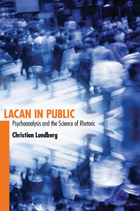
Lacan in Public argues that Lacan’s contributions to the theory of rhetoric are substantial and revolutionary and that rhetoric is, in fact, the central concern of Lacan’s entire body of work.
Lacan’s conception of rhetoric, Christian Lundberg argues in Lacan in Public, upsets and extends the received wisdom of American rhetorical studies—that rhetoric is a science, rather than an art; that rhetoric is predicated not on the reciprocal exchange of meanings, but rather on the impossibility of such an exchange; and that rhetoric never achieves a correspondence with the real-world circumstances it attempts to describe.
As Lundberg shows, Lacan’s work speaks directly to conversations at the center of current rhetorical scholarship, including debates regarding the nature of the public and public discourses, the materiality of rhetoric and agency, and the contours of a theory of persuasion.

Jurij Striedter provides a dynamic introduction to and critique of Russian Formalism and Czech Structuralism. He makes clear the pathbreaking contribution of these European schools to modern literary theory and criticism, placing them in their contemporary contexts and at the same time relating them to ongoing debates in America.
Striedter gives an authoritative account of the development of Russian Formalism from its birth around 1915 through its forced end in the late 1920s, focusing on the contributions of Roman Jakobson, Mikhail Bakhtin, and others to the theory and analysis of literary history, literary genres and narrative prose. He compares the concepts of the literary work, literature as system, and literary evolution in both Russian Formalism and Czech Structuralism to show how these early formalistic approaches led to an elaborated structuralist and semiotic concept of literature as a historically changing system correlated to society and cultural change. He sets forth the work of Jan Mukarovsky and Felix Vodicka, whose Czech Structuralist theory of literary evolution and literary reception (or reader response) anticipated much recent theorizing.
Finally, Striedter brings these ideas into play by showing how they can contribute to the debate of the last few years in North America and Europe about the key issue of literary evaluation. This book and the theories it discusses challenge our contemporary understanding of literature, its history, and its functions in society and human life.
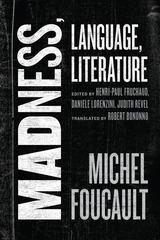
Perceiving an enigmatic relationship between madness, language, and literature, French philosopher Michel Foucault developed ideas during the 1960s that are less explicit in his later, more well-known writings. Collected here, these previously unpublished texts reveal a Foucault who undertakes an analysis of language and experience detached from their historical constraints. Three issues predominate: the experience of madness across societies; madness and language in Artaud, Roussel, and Baroque theater; and structuralist literary criticism. Not only do these texts pursue concepts unique to this period such as the “extra-linguistic,” but they also reveal a far more complex relationship between structuralism and Foucault than has typically been acknowledged.
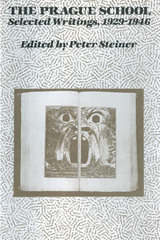
The Prague Linguistic Circle came into being on the afternoon of October 6, 1926, when five Czech and Russian linguists gathered to hear a lecture by a German colleague. From this international beginning, the interests of the group grew to first encompass language in all its functional heterogeneity and then finally all of culture, which the Circle conceived of as a structure of sign systems. Semiotics was thus the overarching discipline for the Prague School, serving to organize all phenomena shared and exchanged by a cultural community.
In recent years increasing attention has been paid to the importance of the Prague School, but writing about it has frequently been marred by misconceptions. The central aim of this volume is to correct those misconceptions and to present the diversity of interests within the Prague School—literary criticism, linguistics, theory of theater, folklore, and philosophy. These essays by Bogatyrëv, Jakobson, Karcevskij, Mukařovský, Rieger, Vodička, and Honzl are here translated into English for the first time. Some have a special historical value in illuminating critical stages of structuralist thinking; others reveal the timeliness of the School's contributions for the theoretical conflicts of our day. Each essay is accompanied by an informative introductory note, and the whole is followed by the editor's "Postscript," tracing the roots of structuralist aesthetics.
READERS
Browse our collection.
PUBLISHERS
See BiblioVault's publisher services.
STUDENT SERVICES
Files for college accessibility offices.
UChicago Accessibility Resources
home | accessibility | search | about | contact us
BiblioVault ® 2001 - 2024
The University of Chicago Press




